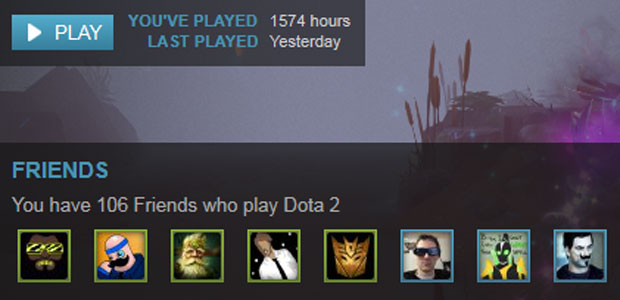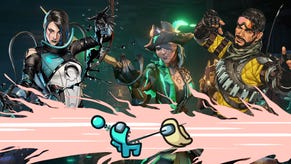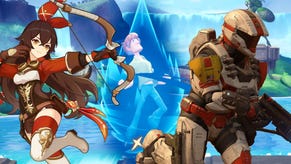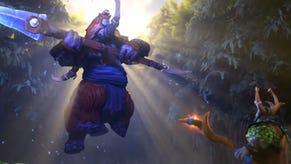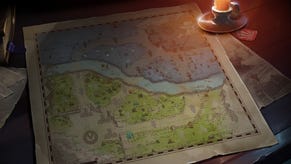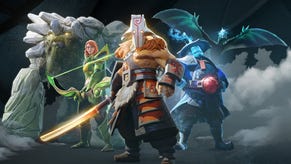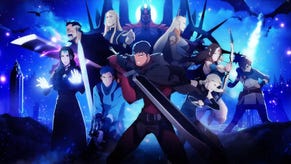Dote Night: Navigating The Friendship Skill Gap
Friendship across an MMR divide
Part of a miscellany of serious thoughts, animal gifs, and anecdotage from the realm of MOBAs/hero brawlers/lane-pushers/ARTS/tactical wizard-em-ups. One day Pip might even tell you the story of how she bumped into Na’Vi’s Dendi at a dessert buffet cart.
There's a sensation I think a lot of people who play multiplayer games with friends will recognise. It's that moment of realisation that the skill and interest levels of your friendship group have started to diverge.
There were a large number of people who arrived at Dota 2's doors a couple of years ago in a flurry of excitement. This was back when the game was in beta. Every now and again Steam would joyfully announce you had new items in your inventory and you would rush to check them out. It would always be five new keys for Dota 2. Honestly, that game was basically the digital game distribution platform version of Tribbles.
Friends were introduced by other friends and people with perhaps a few hours more experience to their name would end up taking on the role of muddled but enthusiastic mother duck to a number of muddled but enthusiastic ducklings. Every so often you'd encounter someone who turned out to have been playing DotA for years already and would say impenetrable things using the old names for heroes or items.
In the very beginning the matches veered towards the chaotic or messy. They weren't displays of outrageous competence as much as they were opportunities to experiment with game mechanics and re-word pop songs to feature various digital wizards. That's not to say it was some kind of magical community of unshakeable positivity. It wasn't. It's more that when you're getting to grips with a complex game it takes a while to get a sense of both the metagame and your own limits.
Pretty quickly you started to get a sense of who was excelling and who was falling behind, though, Or perhaps it's fairer to say that you got a sense of who was playing with a similar mindset and approach to your own. There were people who poured hours into improving and obsessed over statistical differences. They tended to rub up the wrong way those people who wanted it to stay an unscientific kickabout and chatroom. Some got interested in the professional scene and brought in strategies or concepts they'd seen play out in matches far above our tier, others actually ended up on teams at LAN events. A handful of people even decided to go back to other games or hobbies or Socialising With Real People In The Evenings.
After the first few weeks the playerbase around me distilled into particular groups and roles. I know who tends to play relatively conservatively, just as I know who tends to go off-piste and pick a random hero regardless of the consequences. But beyond this, people started to drift away from each other based on perceived or actual skill. It's not an absolute truth but the tendency seems to be that you gravitate towards people around the same level as you are. In some cases that's actually enforced by the game itself. One friend's MMR is so far above mine it actually precludes us playing ranked matches together – Dota 2's systems simply won't allow it.
The emergence of these groups is a gradual thing. I only really thought about it when a friend asked "Why do we never play together anymore?" Skill difference wasn't actually the reason in that case but I was suddenly aware of how many people I used to play with and simply no longer do. I don't want to babysit, neither do I want to feel like the kid sister lagging behind the group and having the bigger kids get to do all the fun or impactful stuff.
Assuming this would be even more noticeable to professional gamers regardless of the specific game I've been adding a question to any interviews I conduct with them – "Does being one of the best players in the world at this game mean you can no longer play with your non-pro gamer friends?"
Matt 'Impaler' Taylor is a professional League of Legends player with Supa Hot Crew. I asked him about how he found playing with friends now that he was part of the LCS. "After you've competed a lot and you want to win all the time it's no longer fun messing around unless it's messing round with friends, and then you're not really there for the game. You're there just to play with your friends. Then League of Legends is a side topic. I can't look at League of Legends or any competitive game the same having played competitively because I've got that hunger to win now."
Emil "EmilZy" Nielsen is the coach for Team Coast Blue's Smite team. I met him at the kick-off LAN for the Smite EU pro league. "I played a lot with friends but now – they're actually pretty good at the game but they're not at my level at all so I play a lot solo and then of course with the Team Coast guys," he said. "It's never going to get boring to play with friends because you could go troll and have fun but it was more fun when you were on the same level. Now I might get a bit frustrated if someone does [something] I would never do."
It can be hard not to feel frustrated when the skill or mentality of the people you previously enjoyed playing with doesn't quite mesh with your own. Probably the healthiest responses would either be to use it as impetus to improve your own game (if you're lagging) or enjoy playing with new people (if you've accelerated). There's also a lot to be said for learning to deal with your own frustrations when it comes to playing a multiplayer game. The thing I found most positive in the pro player responses – and one which I try to implement myself – is that rather than losing their friends entirely as teammates they just find other ways to think about those games which ensure the time spent is still enjoyable.

